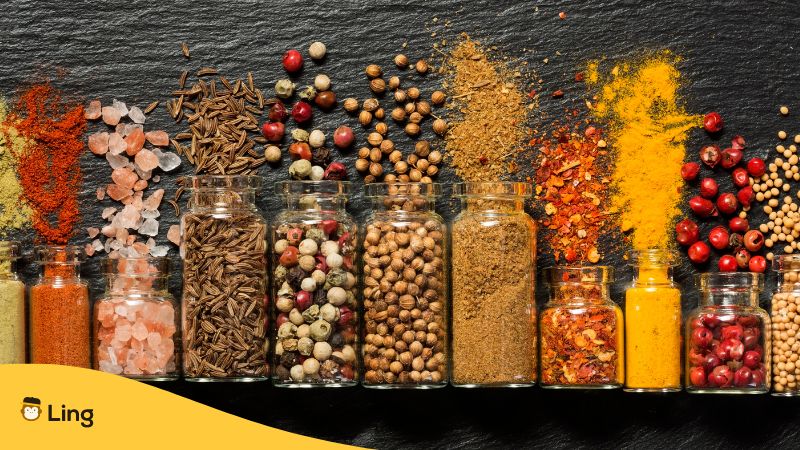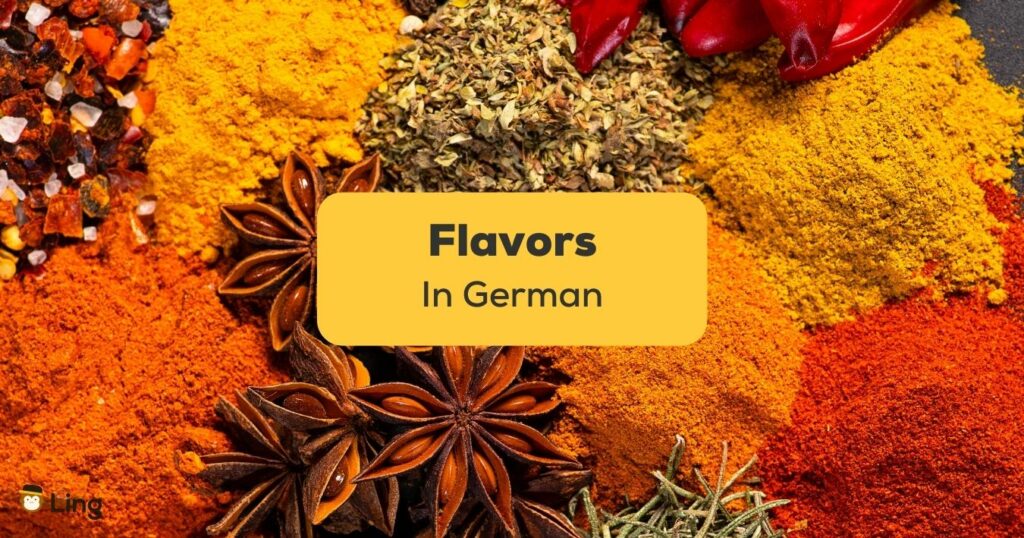If you’re a foodie, then you know that having a diverse vocabulary to describe the taste of your favorite dishes and drinks is everything. But have you tried German delicacies yet? Trust us, you’ll need a whole new set of words to capture the unique Geschmack or flavors that’ll tantalize your taste buds. In this post, we’ll take you on a wild journey as we explore the top words of flavors in German and show you how to use them in context. Let’s begin!
From the savory currywurst to the crispy schnitzel, travelers will certainly be seduced to try out the unique flavors of German cuisine. And honestly, we can’t blame you if you’ll give in! When I visited Germany during Christmas, the cobbled streets were filled with the most heavenly aroma of the classic stollen. Despite being on a strict diet, my willpower quickly crumbled the moment I caught a whiff of that sweet and buttery scent.
And just like any woman with a weakness for treats, I grabbed my purse and asked how much it is by saying, “Wie viel kostet das?” While my pronunciation is definitely off, I bet the man didn’t have trouble understanding when he saw how laser-focused I was on that piece of stollen.
But hey! Just because the other person understood me once, that doesn’t mean that I should rely on my looks or body language alone. We need to communicate effectively by using German words! So in this post, we’ll go over the top vocabulary used for flavors in German so that you can say something beyond asking how much something is.

Basic Vocabulary For Flavors In German
The German language offers a diverse range of vocabulary to describe new flavors, from mild to strong, sweet to sour, spicy to bitter, and everything in between. In this section, let’s first focus on the basic adjectives you’ll encounter in German food and drink menus.
| English | German |
|---|---|
| Sweet | süß |
| Sour | sauer |
| Salty | salzig |
| Bitter | bitter |
| Umami | umami |
| Crispy | knusprig |
| Greasy | fettig |
| Juicy | saftig |
Adjectives For Strong Flavors In German
If you’re a fan of strong and bold flavors, like when you’re eating various German meat dishes, gravy sauces, and condiments, then you’ll love these German adjectives.
| English | German |
|---|---|
| Strong | kräftig |
| Intense | intensiv |
| Spicy | scharf |
| Hearty | herzhaft |
Words For Sweet Flavors In German
German cuisine is known for its sweet pastries and desserts, like the Schwarzwälder Torte, so it’s no surprise that there are plenty of words to describe sweet flavors. Here are some words that you can use to effectively describe cakes, fruit juices, wines, and more!
| English | German |
|---|---|
| Slightly sweet | süßlich |
| Fruity | fruchtig |
| Extremely sweet | zuckersüß |
| Honey sweet | honigsüß |
Words For Sour Flavors In German
If you enjoy sour flavors like that of lemons and pickled food like gherkins or the German Sauerkraut, then you’ll find these German adjectives useful.
| English | German |
|---|---|
| Slightly sour | säuerlich |
| Juicy and sour | saftig-sauer |
| Vinegary | essigähnlich |
| Fresh and sour | frisch-säuerlich |
Words For Spicy Flavors In German
German cuisine is not particularly known for its spicy food, but there are still plenty of words to describe spicy flavors. Here are the best words that you can use to describe curry, hot sauces, and chili dips.
| English | German |
|---|---|
| Spicy | Scharf |
| Piquant | Pikant |
| Fiery | Feurig |
| Savory | Würzig |
Words For Bitter Flavors In German
Bitter flavors are not as popular as sweet or sour flavors, but they still play an important role in German cuisine. Here are some words to describe bitter flavors when biting into a piece of dark chocolate or drinking coffee.
| English | German |
|---|---|
| Bitter | bitter |
| Bittersweet | bitter-süß |
| Nutty | nussig |
| Earthy | erdig |
Describing Texture In German
Want to comment about the cake or Bratwurst texture? In addition to describing flavors, it’s also important to be able to describe the texture of food and drinks. Here are some common words in German that can help you do just that!
| English | German |
|---|---|
| Soft | weich |
| Hard | hart |
| Crispy | knusprig |
| Chewy | zäh |
| Creamy | cremig |
| Foamy | schaumig |

Common Phrases For Describing Flavors In German
Now that you have a good grasp of the basic vocabulary for flavors in German, here are some common phrases that you can use to describe the flavors of food and drinks.
| English | German |
|---|---|
| That tastes good! | Das schmeckt gut! |
| It has a strong flavor. | Es hat einen kräftigen Geschmack. |
| That is very sweet. | Das ist sehr süß. |
| It is slightly sour. | Es ist leicht sauer. |
| That is spicy and delicious. | Das ist scharf und lecker. |
| The coffee is bitter, but good. | Der Kaffee ist bitter, aber gut. |
| That is very creamy and soft. | Das ist sehr cremig und weich. |

Learn German With Ling
Basically, having a good grasp of the vocabulary for flavors in German can greatly enhance your culinary experiences in German-speaking countries. Whether you’re ordering a sweet dessert, trying a spicy dish, or describing the texture of food, having a variety of words and phrases at your disposal can help you communicate your preferences and engage with the local culture.
If you’re interested in learning more about the German language, there are many resources available to help you get started. One great option is Ling, a language-learning app that offers a wide range of German courses and lessons. With this platform, you can learn German and 60+ other languages at your own pace, with in-depth lessons that are tailored to your skill level and learning style.
So yep! No more sticking with apps that just give your a translation of one word to another! With Ling, you can master grammatical points as well to help you gain confidence in crafting your own sentences like a real pro! So why not give it a try and start building your skills in German today? Download it now from App Store or Play Store to get started!






























































